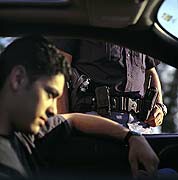- Could Your Grocery Store Meat Be Causing Recurring UTIs?
- Are You Making This Expensive Thermostat Error This Winter?
- Recognizing the Signs of Hypothyroidism
- 10 Strategies to Overcome Insomnia
- Could Artificial Sweeteners Be Aging the Brain Faster?
- Techniques for Soothing Your Nervous System
- Does the Water in Your House Smell Funny? Here’s Why
- Can a Daily Dose of Apple Cider Vinegar Actually Aid Weight Loss?
- 6 Health Beverages That Can Actually Spike Your Blood Sugar
- Treatment Options for Social Anxiety Disorder
Certain Meds, Driving Can Be Deadly Mix: FDA


TUESDAY, Oct. 7, 2014 (HealthDay News) — Thinking about taking a drive after popping some over-the-counter medications? Better check the label first, warn experts at the U.S. Food and Drug Administration.
The agency cautions that some common nonprescription medicines can impair your ability to drive and operate other vehicles and machinery safely.
Some of the most common of these drugs include certain types of nonprescription antihistamines, anti-diarrheals, and anti-nausea medications, according to the FDA.
“You can feel the effects some over-the-counter medicines can have on your driving for a short time after you take them, or their effects can last for several hours,” Dr. Ali Mohamadi, a medical officer at the FDA, said in an agency news release. “In some cases, a medicine can cause significant ‘hangover-like’ effects and affect your driving even the next day.”
And if you haven’t had enough shut-eye the night before, taking medicines that cause drowsiness can increase your daytime sleepiness and fatigue.
Carefully read the labels of nonprescription medicines before you take them, especially if you know you’re going to be driving, the FDA news release says. Check to be sure you’re not taking more than one medicine with the same active ingredient.
In addition, read the entire “warning” section on a medicine’s label in order to find out if it should not be used with any condition you have, whether you should ask a health care provider whether you can use it, or when you should stop using it.
It’s also crucial to check the “When using this product” section of the label to find out how the medicine may affect you and whether there are warnings about drowsiness or impaired driving, the FDA said.
Other important information that may be on labels is how the medicine reacts with products such as alcohol, sedatives or tranquilizers.
If you can, try to use medicines that treat your condition but do not have active ingredients that cause drowsiness or affect your ability to drive or operate machinery. Your health care provider may be able to help you with this, the FDA said
“If you don’t read all your medicine labels and choose and use them carefully, you can risk your safety. If your driving is impaired, you could risk your safety, and the safety of your passengers and others,” Mohamadi said.
More information
The U.S. National Highway Traffic Safety Administration has more about medications and driving.
Source: HealthDay
Copyright © 2026 HealthDay. All rights reserved.










